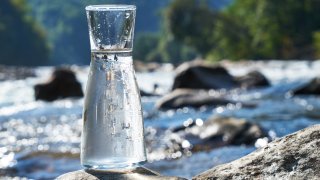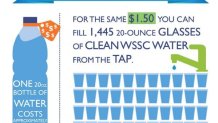

The following content has been provided by WSSC Water. This content does not represent the opinions of the NBC Washington news team. Click here to learn more about WSSC Water.
More and more, people are concerned about the safety of their tap water. After all, there have been several high-profile news stories over the last several years on water issues in cities and towns throughout the country.
So, what about the two Maryland jurisdictions served by WSSC Water: Montgomery and Prince George’s counties? For starters, the utility works to make sure it meets all requirements of the Safe Drinking Water Act. “It’s a job all of us take seriously,” says WSSC Water General Manager and CEO Carla A. Reid. “And it’s even more crucial during this public health crisis.”
We're making it easier for you to find stories that matter with our new newsletter — The 4Front. Sign up here and get news that is important for you to your inbox.
Each year, WSSC Water performs 500,000 stringent water quality tests on samples collected at their water filtration plants and strategic locations throughout their 1,000 square-mile service area. Bottom line: WSSC Water customers needn’t spend hard-earned money on bottled water.

The lowdown on lead
WSSC Water completed its latest triennial Lead and Copper Rule tap sampling in 2020. 90 percent of the homes/buildings they tested had lead levels less than the analytical reporting limit of 1.0 parts per billion (ppb) and well below the U.S. Environmental Protection Agency’s Action Level of 15 ppb.
To ensure their system is free of lead pipes, WSSC Water conducted an aggressive search in 2005 to find and replace any lead pipes in its distribution system. These are the pipes on public property, owned and maintained by WSSC Water.
It’s important to note, though, that plumbing pipes and materials inside homes and other buildings can still be a source for lead in your water. WSSC Water is responsible for providing high quality drinking water but cannot control the variety of components used in home and building plumbing components.
To get information on lead in drinking water, testing methods, and steps you can take to minimize exposure, call the Safe Drinking Water Hotline (800-426-4791) or click here. To read answers to frequently asked questions about lead in drinking water click here.
No need to worry about harmful chemicals
WSSC Water also tests for the presence of Per- and Polyfluoroalkyl Substances (PFAS) at their Potomac and Patuxent water filtration plants. Recent test results confirm that their drinking water is safe from PFAS.
Manmade chemicals developed in the 1940s, PFAS were made to resist fire, oil, grease, water, and stains. The chemicals are found in a wide range of consumer and industrial products, including nonstick cookware, stain repellants, dental floss, cleaning products, and cosmetics.
The chemicals commonly enter the environment as discharges from PFAS manufacturing and processing facilities, and from facilities that use the product in large quantities, such as airports and military installations. Two of the most common compounds—PFOA and PFOS—have been the most extensively produced chemicals and are very persistent in the human body and environment. Accumulating over time, these chemicals don’t break down. Once they enter the environment and source water, PFAS compounds cannot be removed by the water treatment process.
WSSC Water’s proactive testing measures go above and beyond federal and state requirements. Using a new analytical method developed and approved by the U.S. Environmental Protection Agency, WSSC Water tests quarterly for 18 different PFAS compounds.
Quality water starts at the source
Quality drinking water starts with quality source water, and WSSC Water has two sources of water they process, filter, disinfect, and deliver: the Patuxent and Potomac rivers. Their Patuxent Water Filtration Plant (WFP) produces approximately 40 million gallons per day and their Potomac WFP produces 123.
In addition to purchasing land around their source water as a protective buffer and coordinating trash cleanups, WSSC Water works with the counties, local agencies, and citizens to protect its drinking water supply. They also play key roles in the Potomac River Basin Drinking Water Source Protection Partnership and the Patuxent Reservoirs Watershed Protection Group. Recently, WSSC Water started the Patuxent Watershed Protectors, a volunteer opportunity for groups and organizations to protect their two Patuxent River reservoirs.
Educating customers plays a key role in source water protection. One area of education focuses on reducing salt used on sidewalks and driveways during winter. Salt harms aquatic animals and plants in local streams and is extremely difficult and expensive to remove from the water.
More information and homeowner tips to reduce salt use can be found here.
Your Water is Safe from COVID-19
According to the Centers for Disease Control and Prevention, COVID-19 has not been found in drinking water. Both of WSSC Water’s drinking water filtration plants have recently undergone multi-million-dollar upgrades. Viruses, including COVID-19, cannot survive the state-of-the-art treatment process, which includes filtration, chlorination, and ultraviolet disinfection.
While your drinking water is safe from COVID-19, the virus continues to have a devastating financial impact on families throughout Montgomery and Prince George’s counties. If you are behind on your water bill, WSSC Water is here to help. Water service turnoffs for delinquent customers have resumed. To avoid a service disruption, please contact them immediately or click here.
If you have water quality questions or concerns, call WSSC Water any time, 24 hours a day, at 301-206-4002 or click here.

